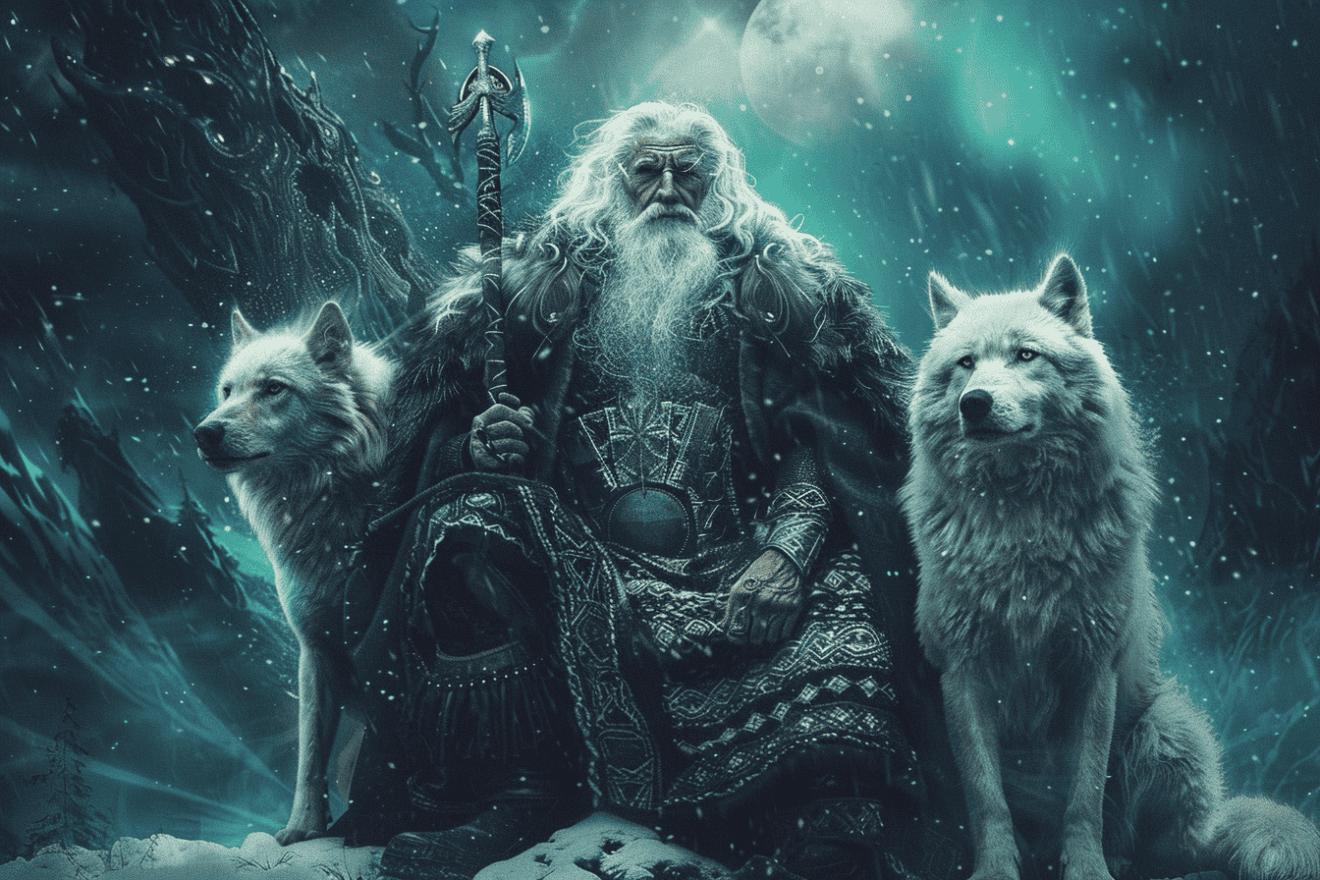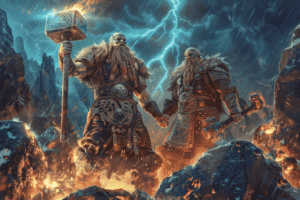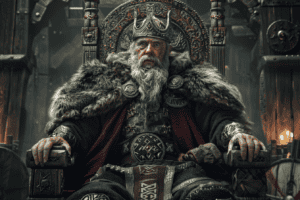Geri and Freki, two wolves deeply ingrained in Norse mythology, accompanied the god Odin on his adventures and battles, symbolizing the intricacies of destruction, chaos, and protection.
These fierce yet loyal companions embodied the intricacies of the Norse world view, which saw nature as a mix of beauty and danger.

In return for their unwavering loyalty, Odin shared his food with them, often feeding them the choicest meat from his plate. The wolves’ presence in battle not only enhanced Odin’s power but also reflected the revered Norse moral of caring for one another.
Norse superstitions saw wolves as a positive omen in battle, believing they’d protect warriors and lead them to victory. The story of Geri and Freki, as told in the Poetic Edda, underscores their importance in Norse culture, where they served as symbols of protection and community.
Odin’s Faithful Companions

As the All-Father, Odin’s creation of the nine worlds and his role in shaping the Viking Lifestyle earned him a revered status among the Norse gods. His wolves, Geri and Freki, were an integral part of his entourage, symbolizing loyalty, strength, and fierce protection.
In Norse mythology, wolves were associated with battle, conquest, and the afterlife, making them the perfect companions for the god of war and magic. As Odin’s faithful companions, Geri and Freki were said to roam the battlefields, feasting on the corpses of the fallen warriors. This gruesome yet fascinating aspect of Odin’s creation highlights the complex and multifaceted nature of the Norse gods.
Through his wolves, Odin demonstrated his power and control over the natural world, solidifying his position as the supreme ruler of Asgard.
Bravery in Battle

Like the fearless wolves Geri and Freki, who roamed the battlefields, bravery in Norse battle demanded fierce loyalty and unwavering strength. These fearless warriors, battle-hardened from countless skirmishes, were the epitome of courage in the heat of combat.
Odin’s loyal wolves, Geri and Freki, embodied this bravery, fighting alongside their master with unrelenting ferocity. In Norse mythology, bravery wasn’t just a validation, but a necessity for survival. Warriors who demonstrated bravery in battle were rewarded with honor, glory, and a place in Valhalla, the great hall of the slain.
Geri and Freki’s bravery wasn’t limited to the battlefield. They were also known for their unwavering loyalty to Odin, often sacrificing their own lives to protect their master. This loyalty was reciprocated by Odin, who’d often reward them with food and drink from the battlefield spoils.
The bond between Odin and his wolves was unbreakable, a confirmation to the power of bravery and loyalty in the face of adversity. Through their bravery, Geri and Freki earned their place in Norse mythology as symbols of courage and devotion.
Symbolism Behind Names

Frequently, the names of mythological creatures and gods hold deeper meanings, and Geri and Freki’s names are no exception, with their etymologies revealing insights into their roles and characteristics.
In Norse Etymology, the names Geri and Freki are derived from Old Norse words ‘gera’ and ‘freka,’ meaning ‘greedy’ or ‘ravenous’ and ‘voracious’ or ‘gluttonous,’ respectively. These names reflect the wolves’ insatiable hunger and their role as Odin’s loyal companions, who devour the bodies of the dead on the battlefield.
This symbolism is further reinforced by the mythological concept of onomastics, where names are believed to influence the characteristics and destiny of the bearer. In this context, Geri and Freki’s names not only describe their physical attributes but also their nature and purpose in the mythological domain.
The names also highlight the wolves’ connection to Odin, who’s often associated with war, death, and the afterlife. By examining the etymology of Geri and Freki’s names, we gain a deeper understanding of their significance in Norse mythology and their role as loyal companions to the All-Father.
Loyal and Protecting Nature

Geri and Freki’s voracious appetites, reflected in their names, are matched only by their unwavering loyalty and protective instincts, which they demonstrate through their steadfast companionship to Odin.
As symbolic representatives of Viking values, these wolves embody the importance of loyalty, bravery, and protection.
In the context of pack dynamics, Geri and Freki’s loyalty to Odin mirrors the bonds between pack members, where protection and defense of the pack are paramount.
Their presence by Odin’s side serves as a reminder of the significance of loyal companionship in Norse mythology. Furthermore, their role as protectors of the All-Father underscores the importance of safeguarding one’s kin and community, a fundamental aspect of Viking culture.
Through their actions, Geri and Freki demonstrate the value of unwavering dedication, showcasing the strength and resilience that arise from loyal relationships.










Add Comment